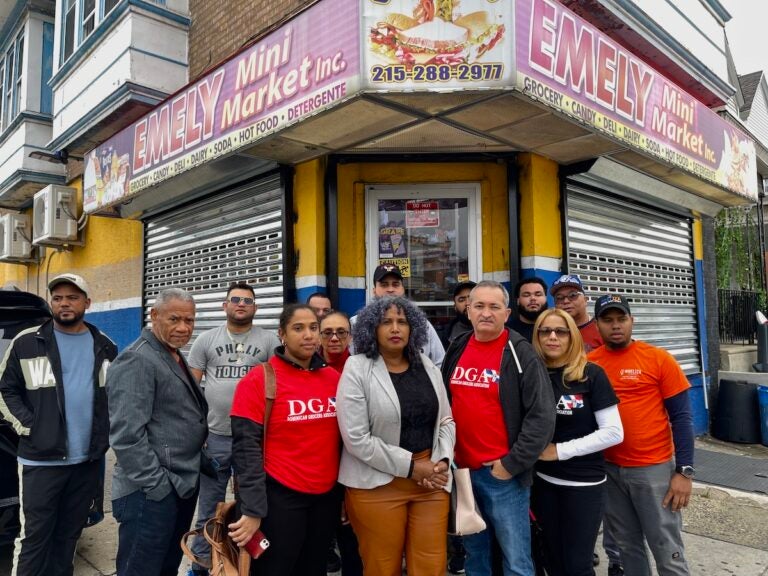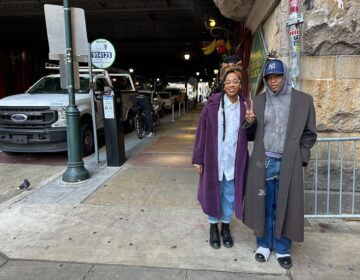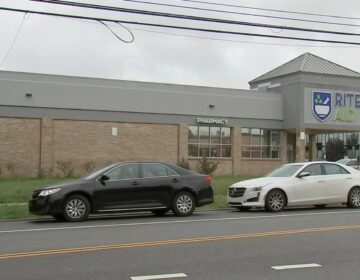Dominican grocers fight for their tobacco licensing in Philadelphia
The network of nearly 2,000 Dominican grocers feel that the Department of Public Health is unfairly targeting their tobacco licenses.

Members of the non-profit Dominican Grocers Association demonstrate their commitment to supporting local businesses outside Emely Mini Market in Northeast Philadelphia. (Amanda Smith/WHYY)
From Philly and the Pa. suburbs to South Jersey and Delaware, what would you like WHYY News to cover? Let us know!
The Dominican Grocers Association is expressing concerns over what they describe as “unfair treatment” and “targeting” by the Philadelphia Department of Public Health.
In September, members of the nonprofit coalition of Dominican grocers and mini-mart owners took to City Hall, waving flags, holding signs, and chanting “basta ya, basta ya” — “enough already” — in protest of gun violence, crime, and “mistreatment” by the Department of Public Health.
“The protest was a nonviolent demonstration of our unwavering commitments to these issues,” said DGA Secretary Frank Rosario. The network of nearly 2,000 Dominican grocers feel that the Department of Public Health is unfairly targeting their tobacco licenses, despite their significant economic contributions to the city.
In Philadelphia, tobacco retailers must have both a state and city tobacco license, which are monitored and regulated by the Department of Public Health.
Retailers who are found in violation of regulations are ticketed by the department, which then has the power to revoke their tobacco licenses.
The DGA alleges that the department has been unfairly focusing on Dominican-owned grocery stores in Philadelphia, according to Rosario, who describes a “disproportionate number of tickets and violations.”
The DGA believes that their businesses are receiving “fraudulent” regulation violations — specifically violations Dominican grocers say involve undercover teenage customers.
“We know that the tobacco industry tends to target minors … When someone picks up tobacco products and starts smoking at a young age they are hooked for life,” explains Palak Raval-Nelson, deputy health commissioner at the Department of Public Health.
The initiative to prevent minor smoking in Philadelphia has led the city to enforce strict tobacco retail regulations, specifically those that prohibit the sale of tobacco products to minors under the age of 21 in Philadelphia.
To monitor and make sure retailers are following regulations, the Department of Public Health works with the Health Promotion Council, an organization that works on community-based outreach, education, and advocacy.
The council hires teenagers to go out to try and purchase tobacco products. Retailers who are found selling tobacco to these undercover minors violate tobacco regulations in the city. The Philadelphia Department of Public Health then gets notified by the Health Promotion Council of the violation.
“We then go out within 72 business hours to issue a ticket to the establishment,” said Raval-Nelson.
However, Rosario says that many times those tickets aren’t received for months by business owners. No proof to appeal violations means that business owners’ tobacco licenses are in jeopardy, a consequence Rosario says can be a huge economic blow to grocers.
This is a concern that state Representative and former DGA President Danilo Burgos says has been ongoing for some time now.
“Grocers are left with no surveillance to counter the violation,” said Burgos.
Raval-Nelson reports that the Department of Public Health acknowledges experiencing a backlog of tickets and staffing challenges this summer, as city services resumed normal operations post COVID health emergency. These factors affected their service efficiency, resulting in delayed ticket processing. However, the department assures that these issues have been resolved and should no longer pose a problem.
Although the issues leading to delays in ticketing have been addressed, the DGA remains focused on challenging what they say is the unjust treatment that their grocers have faced.
Burgos believes that any resolution between the DGA and the Department of Public Health has to be done by making “a real effort to get to the core of the problem, and that means having all those sides at the table”.
Rosario informed WHYY News that the DGA has held recent meetings with both the Philadelphia Department of Public Health and the city Office of Licensing and Inspection. During these meetings, the three groups have been exploring solutions to address current issues and establish better lines of communication going forward.

Saturdays just got more interesting.
WHYY is your source for fact-based, in-depth journalism and information. As a nonprofit organization, we rely on financial support from readers like you. Please give today.





